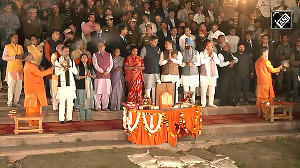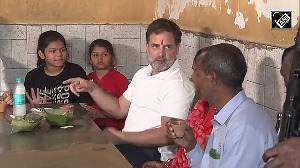Former United States Deputy Secretary of State Richard Armitage has denied that he ever threatened to bomb Pakistan back into the Stone Age, as alleged by President Pervez Musharraf in his book. Armitage made the threat to ensure that Islamabad 'dropped the Taliban like a hot potato' after the 9/11 attacks and joined the US in its war on terror against the Al Qaeda, said Musharraf.
Armitage, appearing in a Brookings Institution discussion on 'The US-Pakistan Strategic Relationship', said, "I have gone my whole career desperately wanting to tell somebody that I would bomb them into the Stone Age and I have never been able to do it because I have never been authorised to do it."
"And, as I have said, further, I have never threatened anything that I could not do. So that conversation never happened. To say that General Mahmood and I had a straightforward, candid conversation would be an understatement, but there were no threats in any way."
Musharraf, in his book In the Line of Fire, wrote, "Our director general of Inter Services Intelligence, who happened to be in Washington, told me on the phone about his meeting with the US Deputy Secretary of State, Richard Armitage. In what was to be the most undiplomatic statement every made, Armitage added to what (then Secretary of State) Colin Powell had said to me ("You are either with us or against us") and told the director general not only that we had to decide whether we were with America or the terrorists, but that if we chose the terrorists, then we should be prepared to be bombed back to the Stone Age. This was a shockingly barefaced threat, but it was obvious that the United States had decided to hit back, and hit back hard."
Armitage, at the Brookings conference, while acknowledging that Musharraf "came to power in an extracurricular way," faulted the Bush administration for striking a deal with Musharraf in order to show that Pakistan was returning to democracy. He pointed out that Washington had pushed for democracy in Pakistan by inserting former Prime Minister Benazir Bhutto into the process.
Taking some hefty swipes at both Bhutto and former prime minister Nawaz Sharif, saying they were corrupt leaders who were elected in a democratic process. The barrel-chested former official, -- who is said to bench press over 400 pounds even as he nears the age of 70--said, "Unfortunately, the late Benazir Bhutto had a chance as a democratically elected leader and I think it is not for nothing that she found herself in Dubai for a number of years, and Nawaz Sharif also has had his difficulties."
"I am not being particularly nasty," he said, "I am just pointing out the fact that one of the things that we have to deal with now is that we do not have a ready candidate for soldier of the month."
Armitage said, "What do we have? We've got a great discussion right now in Washington and beyond in Europe about democracy in Pakistan and that is great--I am all for it. But the question I would have for you is---is democracy an end point?
He argued, "It is not an endpoint, it is a journey that never ends," and added, "By the way, the people of Pakistan under martial law governments and under democratic governments have not received the governance that I think they really deserve. This is a fact that you have had a couple of democratically elected governments and people have not really thrived."
Armitage said that the stakes for a stable Pakistan are so high that Afghanistan cannot be successful unless Pakistan is a success. "And for that matter, I have been delighted in recent years with the betterment of relationships with India and particularly the lessening of the fever of Kashmir."
He said, "It is a problem that needs resolution, but we do not have the situation we had in 2001 and 2002. That is up for grabs if Pakistan is not successful, so the equities here go far beyond 162 million very worthy people in Pakistan."
Armitage said that the US should scrupulously keep out of inserting itself into the upcoming Pakistani elections and said even hinting as to its preferences would be counter-productive.
"The people of Pakistan and the one national institution, the army of Pakistan, will eventually make their wishes known,' he said. "The worst thing that can happen is if we make our wishes known that we prefer someone else--we cannot do that from this distance. We will make an error."
Armitage added, "Also, by being on someone's side will also damage them quite a bit. I was opposed, for instance, to the way that we were seen so publicly as assisting Bhutto's return."
He said it would have been best "had it been kept quiet and seemed to just sort of happen because Pakistanis made this decision. But once we get involved I think it can take on a different sort of colour."
Armitage acknowledged that Musharraf's cracking down on the judiciary and students was nothing to be saluted for and said, "As a matter of fact, notwithstanding what we personally feel about General Musharraf, we do not have to agree with every action he takes."
He said he wished Musharraf "would have had around him a brain trust with whom he could talk about these ideas and have someone say, 'Hey, chief, do you really think that is a good idea, or shouldn't we rethink that?' And my experience when I left government was that there was not that type of brain trust or whatever you call it around Preisdent Musharraf and I think that he suffers for it."
"Right now, I know as you know, that the press and judiciary are the two most popular institutions in Pakistan with the army slipping to third," Armitage said, "and I think one of the reasons is the direct result of that."
When asked if it were Washington's job to be that brain trust, he said, "No, I was suggesting a Pakistani brain trust. If the US did it publicly this would be stillborn, but I was hopeful or would be hopeful that there would be more of almost a national security type adviser or advisers with whom the president of the nation could exchange views quietly and not have them a matter of public speculation and could help him inform his activities."






 © 2025
© 2025